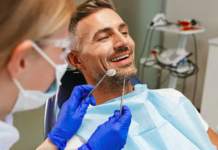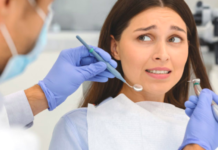When it comes to our overall well-being, oral health plays a pivotal role that often goes underestimated. Imagine waking up in the middle of the night with an excruciating toothache or accidentally chipping your tooth while enjoying your favorite snack. These unexpected incidents are known as dental emergencies, and they can cause not only immediate pain but also potential long-term complications if not addressed promptly.
The purpose of this article is to shed light on the realm of dental emergencies, explaining what they are, why they matter, and how to effectively manage them. Dental emergencies can encompass a range of situations, from toothaches that leave you restless to knocked-out teeth that demand immediate attention. By understanding what constitutes a dental emergency and knowing how to respond, you can not only alleviate discomfort but also safeguard your oral health in the long run.
Understanding Dental Emergencies
A dental emergency can be described as any sudden and unexpected oral health issue that requires immediate attention to prevent further complications. These situations often arise unexpectedly, causing discomfort, pain, or damage to teeth, gums, or other oral structures. The significance of addressing dental emergencies promptly cannot be overstated – quick action not only relieves pain but can also prevent infections, protect surrounding tissues, and preserve the overall function and aesthetics of your smile.
Types of Common Dental Emergencies
Toothache
Toothaches, often characterized by sharp or throbbing pain, can result from various factors, including tooth decay, infections, gum disease, or trauma. The pain’s intensity can range from mild discomfort to unbearable agony, potentially accompanied by swelling, sensitivity, or even fever. When facing a toothache, immediate steps can be taken to manage the pain. Rinsing the mouth with warm water, gentle flossing, and utilizing over-the-counter pain relievers are effective ways to alleviate the discomfort temporarily until professional help is sought.
Chipped or Broken Tooth
Accidents happen, and sometimes they involve our teeth. Chipping or breaking a tooth can result from falls, sports injuries, or even biting on hard objects. The severity of the break can vary, from a minor chip to a significant fracture exposing the tooth’s inner layers. If faced with a chipped or broken tooth, it’s essential to remain calm. Rinsing the mouth, collecting any broken pieces, and protecting sharp edges with dental wax are initial steps that can help prevent further damage and ease discomfort.
Knocked-Out Tooth (Avulsed Tooth)
A knocked-out tooth, scientifically known as an avulsed tooth, requires immediate action for the best chance of successful re-implantation. If a tooth is completely knocked out due to trauma, it’s crucial to act within the golden hour. Carefully picking up the tooth by the crown (top part), gently rinsing it with water if dirty, and storing it in milk or a tooth preservation kit are vital steps to preserve the tooth’s viability until you reach a dentist.
Loose or Dislodged Tooth
A loose tooth can be a source of discomfort and anxiety, whether partially dislodged or on the verge of being knocked out. Accidents, sports injuries, or even biting into hard foods can lead to this situation. If you find yourself dealing with a loose tooth, employing a clean cloth or gauze to stabilize it and minimize pain can provide temporary relief. Seeking professional care promptly is essential to prevent further damage or loss.
Oral Soft Tissue Injuries
Injuries to the soft tissues of the mouth, such as lips, cheeks, tongue, and gums, can result from accidents or sports collisions. These injuries often lead to bleeding, swelling, and discomfort. To manage oral soft tissue injuries, gentle pressure with clean gauze, rinsing with saltwater, and using cold compresses can help control bleeding, reduce swelling, and alleviate discomfort.
Immediate First Aid Steps
In the event of a dental emergency, remaining composed is crucial. General first aid steps, such as staying calm, maintaining oral hygiene, and applying cold compresses to reduce swelling, can offer immediate relief and lay the foundation for effective management.
Seeking Professional Help
While immediate first aid steps can alleviate initial discomfort, seeking professional assistance is paramount. Contacting an emergency dentist Lutz, FL as soon as possible ensures proper evaluation, accurate diagnosis, and appropriate treatment. Whether your regular dentist offers emergency hours or specialized emergency clinics are available, reaching out to a dental professional ensures comprehensive care tailored to your specific situation.
This article has covered the introductory aspects, understanding of dental emergencies, and the types of common dental emergencies, along with their initial management steps. In the subsequent sections, we will delve into further strategies for immediate first aid, and how to effectively seek the professional help that is necessary for resolving dental emergencies. By understanding and preparing for these unforeseen situations, you can take proactive steps to protect your oral health and well-being.
Preventive Measures to Reduce Dental Emergencies
Preventing dental emergencies is undoubtedly preferable to dealing with them. By adopting a few simple habits and precautions, you can significantly reduce the likelihood of encountering unexpected oral health issues.
Oral Hygiene Practices
Maintaining consistent oral hygiene routines is a cornerstone of preventing dental problems. Brushing your teeth twice a day with fluoride toothpaste, flossing daily, and using an antimicrobial mouthwash can help keep your teeth and gums healthy. This preventive approach reduces the risk of decay, infections, and gum disease that can lead to dental emergencies.
Dietary Habits
What you eat and drink can also impact your oral health. Avoiding excessive consumption of sugary foods and beverages can minimize the risk of tooth decay. Additionally, refraining from using your teeth as tools for opening packages or cracking nuts can prevent fractures and chips. Incorporating calcium-rich foods like dairy products and leafy greens supports strong teeth and bones.
Protective Gear
Engaging in sports and physical activities can inadvertently expose your teeth to potential trauma. Wearing a properly fitted mouthguard during sports, recreational activities, or even while biking provides an essential layer of protection for your teeth. Custom mouthguards obtained from dental professionals offer superior fit and comfort, reducing the risk of injuries that could lead to dental emergencies.
Conclusion
In the unpredictable realm of dental emergencies, knowledge and preparation can make all the difference. By reading and understanding the information presented in this article, you’ve taken a proactive step towards safeguarding your oral health and that of your loved ones.
Summarizing the Key Points:
We’ve explored the concept of dental emergencies, understanding what constitutes them and recognizing their urgency. From toothaches and chipped teeth to knocked-out teeth and oral injuries, you now possess essential knowledge about the common types of dental emergencies and their initial management steps.
The Importance of Prompt Action:
Promptness is central to effective emergency management. Responding quickly to dental emergencies not only alleviates pain but also prevents potential complications that can impact your oral health and overall well-being.
Spreading Awareness:
Sharing the insights gained from this article with your family, friends, and colleagues can contribute to a more informed community. Empowering others with knowledge about dental emergencies equips them to make informed decisions and respond confidently if such situations arise.
In closing, remember that while this article provides valuable guidance, it’s no substitute for professional dental care. Should you find yourself facing a dental emergency, reaching out to a dentist promptly is the best course of action. By prioritizing oral hygiene, adopting preventive measures, and understanding how to manage dental emergencies, you’re taking proactive steps to ensure your smile remains healthy and vibrant for years to come.











